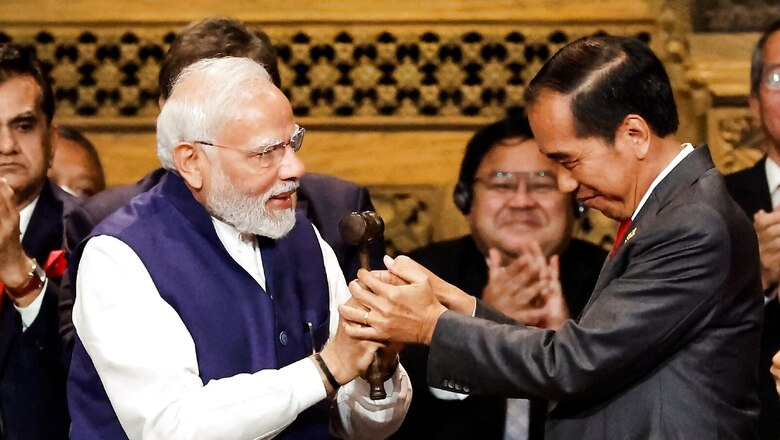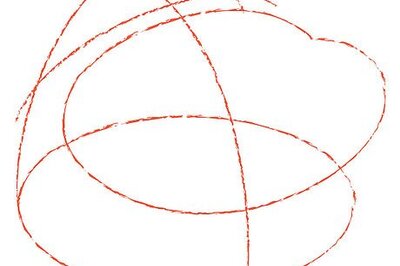
views
It’s all rather like an Indian Premier League series, with big wins and equally big losses; except that this is a grouping made up of both the richest and not-so-rich countries pretending to be a team, but actually ranged on either side of the fence and making up more than 80% of the world Gross Domestic Product. And like the IPL series, each player has his own prestige to think of, even as he plays the game with rapidly changing teammates. The G-20 plays for big stakes, but the importance of India’s Presidency arises from the severe economic crisis that is waiting around the corner, as the world economy reels from natural and unnatural disasters. And some are as unnatural and illogical as it gets.
G-20 STRUTS ITS STUFF
For those who remain confused about the role of this particular grouping among the several dozen others that abound on the international stage, the origins of the G-20 was the 1997 -1999 Asian financial crisis, which hit the developing world badly, leading to a double-digit fall in GDP in some countries. This, however, equally affected the profits of the big economies in the G-7. For clarity, that’s made up of Canada, France, Germany, Italy, Japan, the United Kingdom (UK) and the United States (US), as well as the European Union.
Those leaders then advised Central Bank Governors to begin holding meetings to respond to the crisis. That eventually led to the first formal summit of G-20 (which added Argentina, Australia, Brazil, China, India, Italy, Indonesia, Republic of Korea, Mexico, Russia, Saudi Arabia, South Africa, and Turkey) to coordinate a response to the impact of the US financial crisis.
In other words, this is supposed to be an economic fire-fighting body, but they’ve probably never come up against quite a blaze that is the result of a pandemic, a suddenly severe climate crisis, and a battering Ukrainian war that has hit already weak supply chains. All three issues are therefore up for discussion, but it’s the Ukraine crisis that is a showcase for differing positions and objectives.
THE UKRAINE CRISIS IS EVERYBODY’S CRISIS
First, it has to be reiterated across media that the Ukraine crisis has hit everybody, and badly. Reliable figures put the cost to the global economy as $2.8 trillion, a figure which can only rise as winter sets in and energy shortages rise.
Germany, once the engine of Europe, is set to grow by a tardy 0.3 per cent in 2023. Governments everywhere have been forced to subsidise costs to help populations, resulting in huge government debt. India has done a difficult balancing act as well, as apparent from data of the Reserve Bank of India, which shows a plunging current account balance, from what was a very stable position a year ago. Similar situation is apparent in the Forex reserves as India’s import bill doubled in March, and the government continued to support the rupee, with some $19 billion forex sales. The worrying factor, however, is the shaky Foreign Direct Investment figures with Foreign Institutional Investment dropping into minus figures.
Deft management means India remains stable, but only for now.
THE UKRAINE ISSUE
At the G-20 meeting, unity on Ukraine was clearly missing. The body’s Joint Declaration observed that ‘most’ countries had deplored the war in Ukraine, with the Indian delegation no doubt scoring a sixer by including PM Modi’s earlier phrase that “today’s era must not be of war”.
The joint statement, however, admits that security issues were not the business of the grouping, which while strictly true, is actually bit of hair-splitting. The present crisis is primarily being driven by the Ukraine war, and there’s no getting around that. Logically, the declaration for “tangible, precise, swift and necessary actions, using all available policy tools, to address common challenges” should start with at least walking towards talks on negotiations.
Nothing on that front, although French President Macron was talking to President Xi of unity on getting Russia to the negotiating table.
Meanwhile, given the popular mood against any unilateral condemnation of Russia alone, NATO and G-7 leaders chose to put out their own Joint Statement on support to Ukraine, etc.
THE FALLOUT OF UKRAINE
Meanwhile, the G-20 Joint Statement makes it seem even more like an IPL match, with point-scoring evident, almost throughout between the global south and big economies. Observe the reference to the importance of not imposing export prohibitions or restrictions on food and fertilizers.
India had issued directions to restrict wheat exports as domestic prices spiralled, even as China placed restrictions on export of fertilisers. Both this and other items like oils and cereals have been severely affected by the Ukraine war, and the crisis is how to both prevent inflation at home, even while avoiding a global food crisis.
Another reason for India’s wheat crisis is climate change, as summer temperatures soared above normal, and heavy rain destroyed some 800,000 hectares of standing crops in just Maharashtra, while Punjab is still counting its losses.
Meanwhile, India and China are on the same side of the fence again in terms of defending the use of coal at COP26 while India has targeted an increase in coal production as temperatures rise. It promises zero net emissions by 2070, with a slew of imaginative measures, including large-scale use of LEDs.
Meanwhile, Europe is also returning to coal, as energy prices rise, leading to a huge setback in climate goals.
THE GREAT DIVIDE?
Another divide between the ‘west’ and the rest is apparent as nations fight over who has to pay for the estimated USD 100 billion to be raised (2020-25) to reverse climate change.
Pakistan’s claim that someone has to compensate it for the worst floods in its history when its emissions are negligible cannot be dismissed lightly. Dedicated research under the Climate Change Umbrella observes that emissions attributable to the U.S (1990-2014) caused GDP losses across South America, Africa, and South and Southeast Asia due to climate change and lower agricultural yields.
True, China and India together with the US are among the top emitters accounting for10 billion tonnes, 5.41 billion tonnes and 2.65 tonnes in 2016-2019, respectively.
G-20 as a whole represents some 75 per cent of global greenhouse gases. That’s a lot.
No wonder then that UN Chief Antonio Guterres talked of G-20 as the ‘ground zero’ for change. But solidarity is elusive as COP27 at Sharm al Sheikh draws to a close, which, together with the “Ukraine effect’ is likely to cause a major divide along ‘east-west’ lines or indeed anywhere at all.
As Harry Potter fans would say, this could be a ‘shape shifter’. In other words, the alliances and loyalties, which in international relations are ephemeral anyway, may change rather swiftly as national leaders adjust to the new situation that may require them to work with erstwhile enemies.
These leaders, especially those heading democracies, have to answer to their people, not the ‘suits’ from elevated circles. To prevent this, it is urgent that Europe and its allies, who have already delivered two devastating world wars, work quickly to prevent this one from spiralling.
This is a world war already, but of a different kind. Its violent portion war may be in Ukraine, but the rest of it is likely to spiral into a damaging trade, energy and even water war as a very real climate crisis kicks in.
World War II killed three million Bengalis by famine as Churchill diverted food to the ‘liberated’ countries, more than half a million South Asian refugees fled Burma and some 89,000 of 2.3 million soldiers died in military service.
If you think that’s terrible, you’ve ain’t seen nothing yet. This is probably the promise of G-20. It’s illogical, but that’s it.
The author is a Distinguished Fellow at the Institute of Peace and Conflict Studies, New Delhi. She tweets @kartha_tara. The views expressed in this article are those of the author and do not represent the stand of this publication.
Read all the Latest Opinions here

















Comments
0 comment